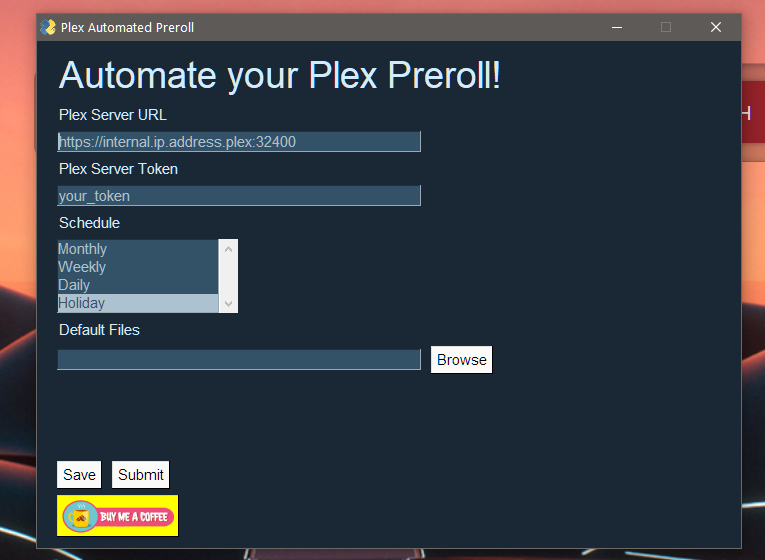raspi-plex-transcode
Help for manipulating the plex-media-server transcode on the raspberry pi
Ensure hardware decoding works and your firmware is up to date
As mentioned in this forum post: https://forums.raspberrypi.com/viewtopic.php?t=262558
Hardware decoding of h264 will NOT WORK if the gpu memory is limited. I had added gpu=16 in my config.txt since I run my pi headless and thought it to be a waste of ram. Setting it to gpu=128 (the default) should be fine.
Brought to my attention by "fancybits" in the plex forums it is recommended to update the rpi kernel and firmware by running sudo rpi-update.
https://forums.plex.tv/t/hardware-transcoding-for-raspberry-pi-4-plex-media-server/538779/236
Compiling plex ffmpeg with custom options
Here is what I did to compile the plex-fork of ffmpeg:
cd /home/pi
cat /usr/lib/plexmediaserver/Resources/LICENSE | grep "Plex Transcoder"
# Copy the URL from the grep command and use it for the following wget
wget https://downloads.plex.tv/ffmpeg-source/plex-media-server-ffmpeg-gpl-62cc2bc17d.tar.gz
tar -xvf plex-media-server-ffmpeg-gpl-*.tar.gz
rm plex-media-server-ffmpeg-gpl-*.tar.gz
mv plex-media-server-ffmpeg-gpl-* plex-media-server-ffmpeg
cd plex-media-server-ffmpeg
sudo apt install libass-dev libaom-dev libxvidcore-dev libvorbis-dev libv4l-dev libx265-dev libx264-dev libwebp-dev libspeex-dev librtmp-dev libopus-dev libmp3lame-dev libdav1d-dev libopencore-amrnb-dev libopencore-amrwb-dev libsnappy-dev libsoxr-dev libssh-dev libxml2-dev libomxil-bellagio-dev
# If you want to apply patches or make changes to the ffmpeg source, do it here
./configure --extra-cflags="-I/usr/local/include" --extra-ldflags="-L/usr/local/lib" --extra-libs="-lpthread -lm -latomic" --enable-gmp --enable-gpl --enable-libaom --enable-libass --enable-libdav1d --enable-libfreetype --enable-libmp3lame --enable-libopencore-amrnb --enable-libopencore-amrwb --enable-libopus --enable-librtmp --enable-libsnappy --enable-libsoxr --enable-libssh --enable-libvorbis --enable-libvpx --enable-libwebp --enable-libx264 --enable-libx265 --enable-libxml2 --enable-mmal --enable-omx --enable-nonfree --enable-version3 --target-os=linux --enable-pthreads --enable-openssl --enable-hardcoded-tables
make -j5
sudo usermod -a -G video plex
Hooking into the plex transcode process
In order to use a different (hardware-)encoder I wrote a small shell script that can be put in place like this:
cd /home/pi/plex-media-server-ffmpeg
wget https://github.com/ForsakenNGS/raspi-plex-transcode/raw/main/ffmpeg-transcode
wget https://github.com/ForsakenNGS/raspi-plex-transcode/raw/main/ffmpeg-transcode.yaml
# Edit the configuration file to your needs
chmod +x ffmpeg-transcode
cd /usr/lib/plexmediaserver/
sudo mv 'Plex Transcoder' 'Plex Transcoder Backup'
sudo ln -s /home/pi/plex-media-server-ffmpeg/ffmpeg-transcode 'Plex Transcoder'
This will replace the output video encoder with the one defined in the configuration. (by default h264_v4l2m2m) Also it increases the buffer size (double of default) and allows to change the segment duration of the chunks that are being rendered.
Configuration
The wrapper ffmpeg-transcode will replace the plex parameters according to the configuration file ffmpeg-transcode.yaml. An example can be found in this repository as instructed to download above. The following options are available:
executable (required)
Defines the ffmpeg executable that is invoked with the altered parameters. The default is /home/pi/plex-media-server-ffmpeg/ffmpeg
profiles (required)
A list of profiles indexed by name that are being used to adjust the plex parameters. Each profile requires an input and output key which defines overrides for the default parameters. An example as included in the default configuration:
'profiles':
'default':
'input':
'output':
'-codec:0': 'h264_v4l2m2m'
'-crf:0': '10'
'-minrate:0': '1M'
'-maxrate:0': '5M'
'-bufsize:0': '10M'
'-seg_duration': '2'
- Everything in the
inputsection applies to the input stream (everything before the-i filenameparameter). - Everything in the
outputsection applies to the output stream (everything after the-i filenameparameter). - Any valid ffmpeg parameter can be used.
- Repetitions of the same parameter are currently not supported.
profile_select
Controls when certain profiles are used. The following child-keys are available:
- default Defines a default profile which is used if no other rule matches. Example:
'profile_select':
'default': 'default'
- by_argument Defines conditions which will trigger a certain profile to be used.
- argSection One of either
inputoroutput. This will decide whether the script will check the given argument for the input or the output stream. - argName The name of the argument as supplied by plex. e.g.:
-codec:0will check the video codec,-iwill check the input file. - type What kind of condition will be checked. Available are:
- exact Matches if the given
valueparameter matches the value of the specified argument. - regex Matches if the regex supplied within the
valueparameter matches the value of the specified argument. - present Matches if the specified argument is present.
- missing Matches if the specified argument is missing.
- exact Matches if the given
- ignorecase Currently only used for the
regextype. Makes the regular expression case insensitive. - value The value used for matching with the
exactandregextypes. - profile The target profile as defined in the
profilessection that is used if the condition matches. - priority A priority that is used when multiple conditions match. Higher is more important. If omitted the default priority of
0is used.
- argSection One of either
Example that will match if the path or filename contain the string anime somewhere:
'profile_select':
'by_argument':
-
'argSection': 'input'
'argName': '-i'
'type': 'regex'
'ignorecase': true
'value': '.*anime.*'
'profile': 'anime'


